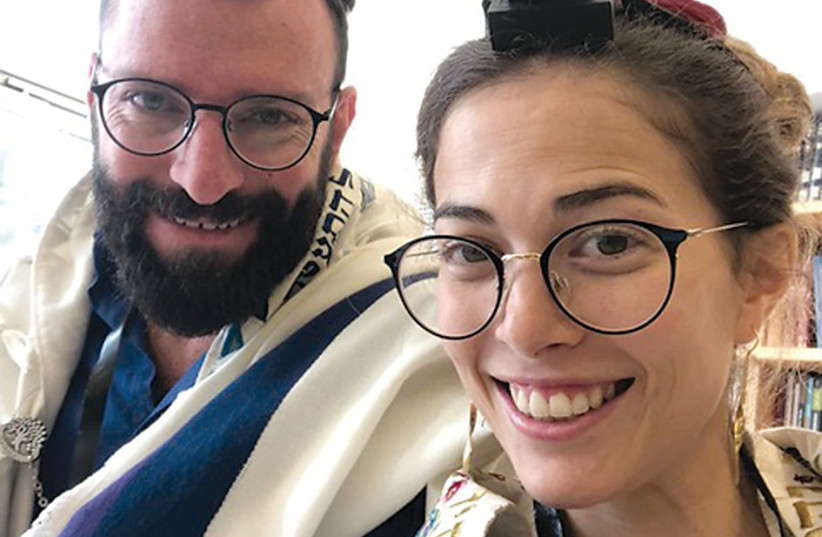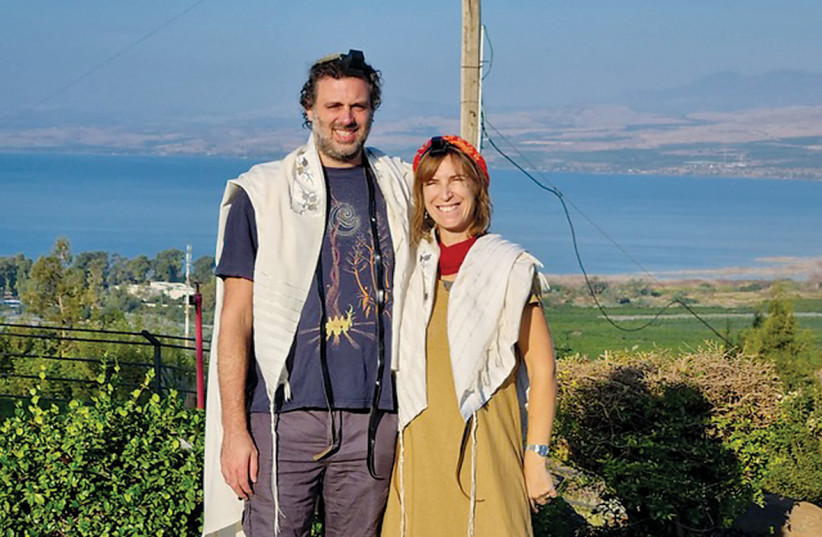This realization united the latest class to graduate from the Schechter Rabbinical Seminary in Jerusalem in December.,where the new generation of rabbis is being trained. Each member seeks to create their own reality by inventing new forms of community.
“They come from diverse backgrounds and reach out to all,” notes Rabbi Avi Novis-Deutsch, dean of the SRS. “This is the message they want to convey.”
Novis-Deutsch has noted an increase in demand for the Schechter Institutes’ services over the past five years. “We’re moving step by step, because we have to finance the activities, starting with something sustainable,” he says. “We’re also ordaining more rabbis, but it’s a gradual process. Our graduates conducted about 2,000 bar mitzvahs this past year.”
These religious leaders will determine how tomorrow’s communities will look.

“My story shows that anything can be done if you have the belief and motivation,” says newly ordained Rabbi Eitan Krul, 48, a gay single father of a five-year-old boy who lives in the Ezra neighborhood of South Tel Aviv. “The whole concept is unusual – I bring together all the weak sections of society.”
Ezra is a working-class neighborhood of mainly immigrants from Islamic countries, traditional Sephardim not aware of liberal Judaism. Twenty years ago he became the neighborhood’s first openly gay resident when he bought the house. “I realized that here, in this neighborhood, I have a mission to fulfill,” says Krul.
HaBayit BeGadishta, as his home is known in the neighborhood, embraces those whose religion often excludes them: single parents, gay families and residents without family.
“My house is always open to anyone who wants to celebrate Shabbat and holidays or study Talmud,” he says. “The only condition for entering is that everyone is accepted. It’s a home with Jewish values. It is also the only house on the street with a bomb shelter – during the last Gaza war the whole street gathered here. That brought us closer.
“My Judaism is inclusive Judaism, where a woman can read from the Torah. I have to make it happen because it doesn’t exist elsewhere in the neighborhood. Slowly I revealed that I’m not alone, that I can serve as an anchor.”
Krul has always seen himself as a leader and social entrepreneur, and for him the gift he received comes with responsibility, a mission to draw in people who need guidance and help.
“This Ezra neighborhood is strong,” he says. “I wish to lead a change in the social discourse in our country, to renew a dialogue of mutual acceptance and love. I believe that if many people would work for the needed change, this would lead the people of Israel to finally be one people.”
Rabbi Nava Bernstein Meiersdorf’s infectious smile seems to radiate around her. “My language comes from a positive place – I’m a Jew, a believer, I pray, I do. It’s not about who I’m not,” she beams.
Meiersdorf, 32, is married to Rabbi Yerach Meiersdorf, rabbi of the Masorti NOAM Youth Movement who graduated from the Schechter Rabbinical Seminary in 2017. They have one child. Together they have established a unique Jewish community in the picturesque Ein Kerem neighborhood on the outskirts of Jerusalem, where for the past five years they have brought dozens of residents together every Shabbat and on holidays for Torah study and joint prayers.
“Communities hold the Jewish world together, in my opinion,” says Meiersdorf. “My vision is to always look for what connects rather than divides us, and through this to maintain the Jewish tradition.”
Originally from Petah Tikva, Meiersdorf was raised in a haredi household before branching out, earning a bachelor’s degree in theater at Emuna College and later studying at UCLA. She discovered liberal Judaism while living in the United States. Her “day job” is teaching in Nativ, the largest conversion preparation organization in Israel, where she accompanies students through the conversion process.
Studying at the Schechter Rabbinical Seminary was the right way for her to integrate into the Jewish world, she says: “I wanted to live in Israel. This is my home, but I did not feel I had, as a woman, a significant place here in the Jewish world. I see myself as a group leader, and my goal is to be present in areas where I can influence and help.”

Danny Weininger had already made aliyah, but it wasn’t until he visited his family in New York while on army leave nine years ago that he understood what his life’s path should be.
He was not observant at the time, but seeing how his Conservative rabbi brother’s community functioned opened his eyes. After his military service he studied at Beit Prat, and “felt that the right way for me to learn and deepen in Judaism is purely with joy and love.”
Weininger followed in the footsteps of his brother Aaron, who is a rabbi in Minneapolis. Growing up in the Conservative Zionist world in New York, Weininger has always been involved in community work. He was a youth counselor at the Hartman Institute and headed the Beit Midrash for its pre-military program. Recently married, he currently manages a Jewish Agency conflict-education course for new immigrants, covering the gamut of political opinions.
“My future is in Israel,” he says. “What I find exciting about choosing this liberal rabbinic path is that Israel has had 75 years of establishing what we are. Now we’re entering the next stage of our development. Many Jewish Israelis are looking to connect to something that offers more than just tefillin, candles and other rituals. ‘There are 70 faces to the Torah.’ Each of us was given the revelation in our own voice at Mount Sinai.”
Amirit Rosen’s father was Chief Rabbi of Ireland before the family moved to Israel in 1985, when she was three. He engaged extensively in interfaith dialogue, so growing up she was used to non-Jewish religious figures visiting her home. The ethos that religion should fight for social justice led the family to a vegetarian lifestyle, and later a vegan one.
She studied therapeutic horse riding and worked in the field for several years, but felt a spiritual longing. She studied at the Arava Institute for Environmental Studies together with Americans and Arabs, which fit the concept of combining nature and the environment with social justice and tikkun olam (fixing the world) in a space of spirit and Torah. Having grown up Modern Orthodox, joining the Masorti Movement meant changing her sociological identity, which was not a simple process.
Today Rabbi Amirit and her partner, Rabbi David Goodman, serve as rabbis of the Moreshet Avraham Masorti congregation in Jerusalem’s East Talpiot neighborhood. They presented themselves to the community as a package-deal, and were accepted. She views the model of a rabbinical couple as offering a new pathway both for rabbinical leadership and for the relationship between couples. If in Kabbalah the soul’s power is manifest in a progression of cycles and spheres, there is a unique power in the relationship between a couple that changes perceptions about gender and the face of the female rabbinical role.
The four new rabbis represent diverse places from which to enter Judaism, notes Novis-Deutsch. “We have Hardalim [nationalist haredi] and liberal Orthodox. Eitan grew up as a traditional but secular-leaning Israeli, while Danny came from a Conservative Zionist household. They have completed an intensive five-year program, including two years of MA studies at the Schechter Institute of Jewish Studies, three full years at the Schechter Rabbinical Seminary including many hours of study throughout the week, and weekly practical work in various communities. Where we’re investing more and more is in the on-site education and mentoring in the field, which continues even after they graduate.”
Novis-Deutsch says there are reasons to be optimistic about the future.
“Just look at the makeup of the current Knesset. Our parliament has members who understand the need for different types of Judaism to have a voice. Israel needs to invest in Jewish identity if religious pluralism and tolerance are to flourish. The only way to do that is by presenting the options.
“The future is a combination of growth in ordaining rabbis and serving the congregations, and a shift toward introducing new ideas of community. We are pretty successful in training personnel in the field who are not necessarily rabbis, but prayer-leaders, lay leaders, and continuing education in the field. The same day as the inauguration we completed a training seminar for a group of rabbis to work with people with special needs.” ■
